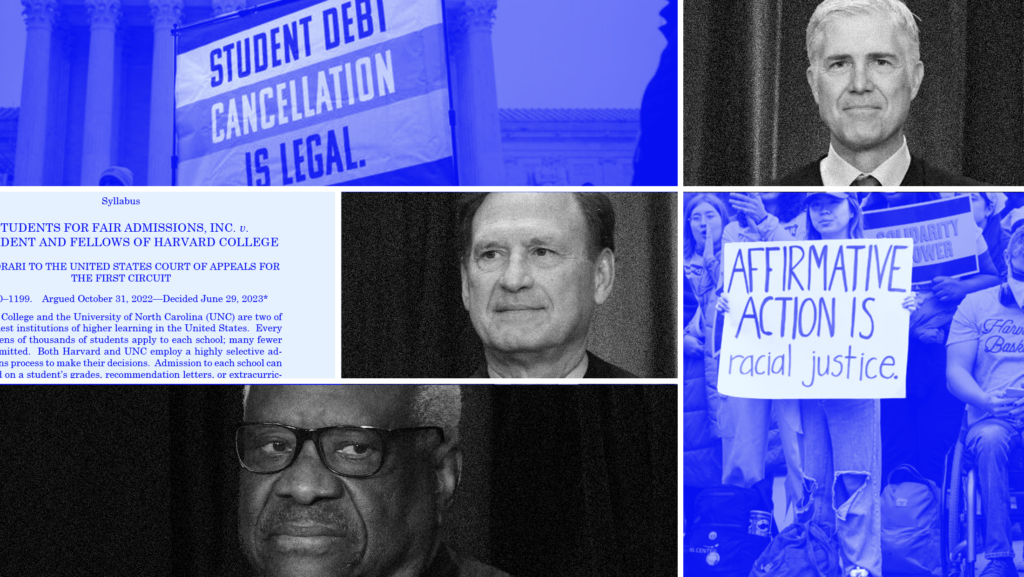The U.S. Supreme Court’s Supreme Takeover

As the U.S. Supreme Court approached the final days of its term, there was some speculation that perhaps Chief Justice John Roberts prevailed in moderating the Court’s most extreme case elements. In out-of-character rulings, he had preserved what is left of the Voting Rights Act, protected state Supreme Courts’ role in checking election policy and upheld the Indian Child Welfare Act.
But as the final decisions of the term dropped, it was clear this Court is as extreme as ever — with the chief as much in the mix as any of the Trump appointees.
The Supreme Court has effectively ended affirmative action in education, created a blanket license for business owners to discriminate against LGBTQ+ people (and anyone else really) and trampled President Joe Biden’s student debt relief plan. The affirmative action and religious discrimination cases again overturned decades of precedent for no good reason, while the student debt cases employed a Congress-be-damned approach to separation of powers. All together, these legally indefensible decisions demonstrated there are no limits to this Court’s hunger for power.
The justices seemed as determined as ever to make 21st century society far less egalitarian than the latter half of the 20th century. For example, with its ruling to end affirmative action, the Court has imposed a “colorblind” interpretation on the U.S. Constitution. But the entire point of the 14th Amendment, as Justice Ketanji Brown Jackson has dutifully explained, was to rectify the massive inequities that Black Americans faced after generations of slavery.
You can’t address racism without taking race into consideration, and yet now we find ourselves without tools that are useful and available. While we will find ways around this ruling to continue the important work of dismantling white supremacy, it remains a perplexing state of affairs to have tools within reach that were available just yesterday but cannot be touched today.
This Court is seizing the opportunity to do as much damage to our civil rights and health and safety as it possibly can.
Then consider the Court’s brazen ruling in 303 Creative LLC v. Elenis. Today, businesses can advertise their willingness to discriminate against LGBTQ+ people — and presumably any other legally protected group — when just last week we held as an article of faith that public accommodations were to be provided equally to all. We all knew from previous cases like Masterpiece Cakeshop v. Colorado Civil Rights Commission (2018) and Fulton v. Philadelphia (2021) that these justices were slobbering at the opportunity to justify religious discrimination.
Yet, now that they have done it, we know that their faith in the Constitution is second to their desire to pervert the First Amendment and resegregate our public spaces. Even Justice Antonin Scalia — no friend to the LGBTQ+ community — understood, “A tax on wearing yarmulkes is a tax on Jews.” This Pandora’s box will surely lead to countless more lawsuits as businesses eager to discriminate generate new free speech lawsuits, claiming that their denial of service is also “speech.”
Finally, blocking Biden’s student loan forgiveness is salt in the wound. The president’s power to cancel student debt is amply demonstrated by a simple principle: A creditor is always free to release a debtor from their obligation. The president (and presidents before him) used this simple axiom to restructure and forgive various debts owed, including to victims of fraud.
Yet, this Court decided this power was too broad if exercised by a president named Biden on behalf of Black and brown borrowers who stand most to benefit from that forgiveness. So, in two short days, we found that Black and brown students were both less welcome at elite universities and more indebted to their government for having attended them.
As Justice Elena Kagan wrote in her dissent in the student loan cases: “The Court acts as though it is an arbiter of political and policy disputes, rather than of cases and controversies.” And that’s just it: This 6-3 Trump Court has set this country back decades by rolling back abortion rights, gun safety, water safety, union rights, racial equality, LGBTQ+ rights and more. And they’ve done it all, as we have increasingly learned, while greatly enriching themselves thanks to their Republican-funding billionaire friends who unquestioningly would support these outcomes.
As Biden said, “This is not a normal Court.” It doesn’t matter how many other cases preserved the status quo or found different alignments among the justices; we dare not call this a moderate Court. In the cases that have the biggest impact on the most Americans, this Court is seizing the opportunity to do as much damage to our civil rights and health and safety as it possibly can. And if they can set us back that far in just two years, what else is in store for the years to come? Why should we wait around to find out? How much damage will they do before there is consensus that it’s time to act?
Rakim Brooks is a public interest appellate lawyer and the president of Alliance for Justice. As a contributor to Democracy Docket, Brooks writes about issues relating to our state and federal courts as well as reforms to our judicial systems.